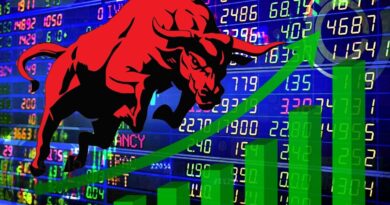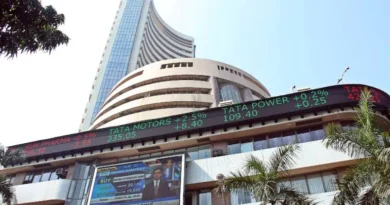Stock Market Today: Top 10 things to know before the market opens on 22th September
The benchmark Sensex and Nifty indices are likely to open marginally higher on September 22 as trends in the GIFT Nifty indicate a positive start for the broader index with a gain of 11 points.
The BSE Sensex plunged 571 points to 66,230 after the hawkish commentary by the Federal Reserve chair, while the Nifty50 was down 159 points at 19,742 and formed bearish candlestick pattern on the daily charts with momentum indicator RSI (relative strength index) remaining in negative crossover in the previous close.
The Nifty index closed below the 20-day EMA (exponential moving average – 19,780), signaling a diminishing bullish sentiment. Weakness appears evident with a bearish crossover in the RSI,” Rupak De, senior technical analyst at LKP Securities said.
He feels the selling on rallies remains the favored strategy as long as it stays below 20,000.
On the downside, the support is situated in the range of 19,700-19,630, he said.
The pivot point calculator indicates that the Nifty may be taking support at 19,714, followed by 19,681 and 19,628.
On the higher side, 19,820 can be an immediate resistance, followed by 19,853 and 19,906.
Stay tuned to Moneycontrol to find out what happens in the currency and equity markets today.
We have collated a list of important headlines across news platforms, which could impact Indian as well as international markets.
GIFT Nifty
The GIFT Nifty indicates a marginally positive start for the broader index with a gain of 11 points.
GIFT Nifty futures stood at 19,662 points after making a high of 19,676 points.
US Markets
Stock futures were flat in overnight trading Thursday as the market is poised to end the week with steep losses.
Futures on the Dow Jones Industrial Average were little changed.
S&P 500 futures and Nasdaq 100 futures were also flat.
The overnight action followed a three-day losing streak for all three stock averages as investors reacted to a signal from the Federal Reserve that it intended to keep interest rates higher for longer.
These lofty levels could put pressure on risk assets like equities.
The S&P 500 and the tech-heavy Nasdaq Composite are down 2.7 percent and 3.5 percent this week, respectively, on track for their worst week since March and their third negative week in a row.
The blue-chip Dow has dipped 1.6 percent in the meantime.
Bond yields surged after the central bank forecast one more rate hike for 2023.
The benchmark 10-year Treasury yield popped 15 basis point to hit a high of 4.498 percent, its highest level since 2007. Meanwhile, the 2-year rate topped 5.2 percent, touching its highest level since 2006.
Investors also became concerned about a government shutdown, which could dent consumer confidence and slow down the economy further.
House Republican leaders sent the chamber into recess on Thursday.
European Markets
European markets closed lower amid a raft of interest rate decisions from central banks in England, Turkey, Sweden, Switzerland and Norway.
The pan-European Stoxx 600 index ended down 1.3 percent, with major bourses and almost all sectors in negative territory.
Travel and leisure stocks saw the biggest drop, down by 3.2 percent, followed by mining stocks, which shed 2.6 percent.
The Bank of England paused its hiking cycle, keeping the policy rate at 5.25 percent, after cooler-than-expected inflation data. The Swedish and Norwegian central banks both opted to hike interest rates, while the Swiss National Bank paused its hiking cycle.
Global markets have also been reacting to the US Federal Reserve’s latest decision to hold interest rates steady.
The move was widely expected but the central bank said it still expects one more hike before the end of the year and fewer cuts than previously indicated next year.
Asian Markets
Asia-Pacific markets fell ahead of the Bank of Japan’s rate decision, which investors will be closely watching to determine if the central bank will make any change to its ultra-easy monetary policy.
A poll of Reuters economists showed that economists all expect the BOJ to hold its benchmark policy rate at -0.1 percent.
BOJ Governor Kazuo Ueda has maintained that an ultra-easy monetary policy is needed until Japan sees a sustained inflation at 2 percent.
Japan’s headline inflation figures have remained above this target since April 2022, with the latest reading coming in at 3.2 percent for August.
Japan’s Nikkei 225 fell 1.15 percent ahead of the BOJ decision, while the Topix slid 0.92 percent.
In Australia, the S&P/ASX 200 shed 1.4 percent, leading losses in Asia. South Korea’s Kospi saw a smaller loss, dropping 0.87 percent, while the Kosdaq slipped 0.7 percent. Futures for Hong Kong’s Hang Seng index stood at 17,585, also pointing to a weaker open compared to the HSI’s close of 17,655.41.
Wipro’s Chief Financial Officer Jatin Dalal resigns, Aparna Iyer to take over
Wipro Chief Financial Officer Jatin Dalal has resigned from the company, the IT firm informed the stock exchanges on September 21. Dalal, a Wipro veteran of over 21 years, has been the company’s CFO since 2015.
His last day with the company will be November 30.
Aparna Iyer, the CFO of Wipro’s FullStride Cloud Global Business Line, will be the new CFO, and will take over as CFO effective September 22. In his resignation letter, Dalal said he is looking to pursue his professional goals outside the organization.
I am deeply grateful to Wipro for the multitude of opportunities given to me over last two decades.
At this juncture of my career, I am eager to pursue my professional goals outside the organization.
Accordingly, I am tendering my resignation,” his letter read.
Dalal’s exit comes when the company has seen a slew of top deck exits. In 2023, the company has so far seen the exits of Chief Operations Officer Sanjeev Singh, Americas 2 CFO Nithin V Jaganmohan, India head Satya Easwaran, iDEAS business head Rajan Kohli, Vice President Gurvinder Sahni, Americas 1 CFO Kamini Shah, head of healthcare and medical devices unit Mohd Haque, and head of the manufacturing and hi-tech business unit Ashish Saxena.
SEBI to ease borrowing norms for large corporates, removes penalty, introduces incentives
The market regulator has eased norms for borrowing by large corporates (LCs) on meeting a certain percentage of their funding requirements from capital markets through the issuance of corporate bonds.
The Securities and Exchange Board of India (SEBI) Board has raised the monetary threshold to define large corporates and removed the penalty for not meeting the mandate–of raising at least 25 percent of incremental borrowings for a financial year through the capital markets.
It has also decided to introduce incentives and moderated disincentives.
A press statement released after the SEBI Board meeting on September 21 stated, “With the view to facilitate ease of compliance and ease of doing business, the Board also decided to retain the requirement that compliance with the framework will be met over a contiguous block of three years.
Further, it has been decided to dispense with the requirement on LCs for filing a statement identifying itself as an LC and statement regarding compliance with the framework.”
Nirma makes big pharma push; acquires 75% in Glenmark Life Sciences for Rs 5,651 cr
Chemicals-to-building-materials diversified conglomerate Nirma has entered into a definitive pact to acquire a 75 percent stake in listed API (active pharmaceutical ingredient) player Glenmark Life Sciences at a price of Rs 615/share for Rs 5,651 crore.
The deal has been struck at enterprise value of around Rs 7,500 crore and Nirma will make a mandatory open offer to all public shareholders of the target as per Sebi regulations. Glenmark Pharma, the parent of Glenmark Life Sciences, will own 7.84 percent in Glenmark Life Sciences after the divestment. On May 23, 2023, Moneycontrol was the first to name Nirma as a suitor in the sale process of Glenmark Life Sciences, which was initiated to reduce the debt burden of Glenmark Pharma.
Sebi eases norms for investors to access unclaimed amount in debt securities, REITs, InvITs
The Securities and Exchange Board of India (Sebi) Board has approved amendments that would make it easier for investors in debt to access unclaimed amounts in debt-listed securities, Real-Estate Investment Trusts (REITs) and Infrastructure Investment Trusts (InvITs).
After the meeting on September 21, the Sebi Board announced approval of amendments to the Investor Protection and Education Fund (IPEF) Regulations, Listing Obligations and Disclosure Requirements (LODR) Regulations, InvIT Regulations and REIT Regulations to streamline the framework for credit of unclaimed amounts of investors in listed entities other than companies.
The press release stated, “The proposal for transfer of unclaimed amounts lying in escrow account for more than seven years, to the IPEF for debt listed entities other than companies under LODR Regulations was approved by the SEBI Board in its meeting held on September 30, 2022.
Similarly, the proposal to transfer the unclaimed or unpaid amounts to investors in REITs and InvITs to IPEF was approved by the SEBI Board in its meeting held on December 20, 2022. Accordingly, changes were made in the REITs Regulations and InvIT Regulations.”
It added, “Consequently, with a view to further streamline the credit of unclaimed amounts and provide for the claim of such unclaimed amounts, the Board has approved amendments to the IPEF Regulations, LODR Regulations, REIT Regulations and InvIT Regulations” to prescribe a uniform process of claim for such amounts in a streamlined manner.
Institutional buyers put Rs 1,450 crore bids for SJVN OFS, stock falls 13% on BSE
Institutional investors on Thursday oversubscribed the SJVN offer-for-sale (OFS), putting in bids worth over Rs 1,450 crore.
The government’s 4.92 per cent share-sale offer in state-owned power producer SJVN was oversubscribed on Thursday with institutional investors bidding for over 20.91 crore shares against 8.70 crore shares reserved for them.
As per stock exchange data, non-institutional investors subscribed the SJVN issue by over two times. At the indicative price of Rs 69.64 per share, the bids are cumulatively worth over Rs 1,450 crore.
The share-sale would open for subscription on Friday for retail investors, who would get additional discount over the floor price.
Shares of SJVN fell 13.05 per cent to close at Rs 71.08 apiece on the BSE. In the 2-day OFS, the government is selling up to 19.33 crore shares or 4.92 per cent stake at a floor price of Rs 69 apiece. The issue includes a green-shoe option of over 9.66 crore shares or 2.46 per cent stake.
Vedanta approves raising funds up to Rs 2,500 crore via NCDs
The board of directors of Vedanta Limited approved raising funds up to Rs 2,500 crore via non-Convertible Debentures (NCDs) on a private placement basis, the company informed bourses on September 21.
“We hereby inform that the duly authorized Committee of Directors at its meeting held today i.e., Thursday, September 21, 2023, considered and approved for raising, on a private placement basis, up to 2,50,000 nos. Secured, Unrated, Unlisted, Redeemable, NonConvertible Debentures(“NCDs”) of face value Rs 1,00,000 each, aggregating up to Rs 2,500 crores in one or more tranche(s),” the company said.
The Anil Agarwal-led company had earlier in the month said that the issuance of NCDs is part of its routine refinancing that is undertaken in the ordinary course of business. Vedanta Ltd, an oil, mining, and metals conglomerate, had gross debt of Rs 66,182 crore as on end-March.
The company’s net debt soared from Rs 38,076 as on December 2022 to Rs 45,260 crore as on March 2023.
The company had earlier said that its net debt-to-earnings before interest, taxes, depreciation and amortization ratio was at 1.28 times as of March.
Oil Prices
Oil prices rebounded in trading on Thursday, after a Russian ban on fuel exports snapped focus away from Western economic headwinds and back to throttled crude supply to the end of 2023.
Brent futures for November delivery were up 14 cents, or 0.15 percent, to $93.67 a barrel. US West Texas Intermediate crude climbed 34 cents, or 0.41 percent, to $90.00, the lowest since Sept. 14.
Both benchmarks had fallen more than $1 earlier on Thursday. Russia temporarily banned exports of gasoline and diesel to all countries outside a circle of four ex-Soviet states with immediate effect in order to stabilize the domestic fuel market, the government said on Thursday.
Dollar Index
The Dollar index traded 0.17 percent lower in futures at 105.39, whereas the value of one dollar hovered near Rs 83.12.
Gold Prices
Gold extended its decline for a third consecutive on Thursday, weighed by the surge in the US dollar and US bond yields after the Federal Reserve hardened its hawkish posture on interest rates.
Spot gold shed 0.6 percent to $1,917.65 per ounce, having briefly touched its highest since Sept. 1 before closing lower in the previous session.
US gold futures eased 1.5 percent to $1,938.00.
The Fed held interest rates steady on Wednesday, but its updated quarterly projections showed that rates may be lifted once more this year and kept tight through 2024.
Gold traders took to heart the Fed’s higher-for-longer messaging… forcing bullion bulls to temper their enthusiasm,” said Exinity chief market analyst Han Tan.
FIIs and DIIs
Foreign institutional investors (FII) sold shares worth Rs 3,007.36 crore, while domestic institutional investors (DII) bought Rs 1,158.14 crore worth of stocks on September 21, provisional data from the National Stock Exchange (NSE) showed.
ByMoneycontrol




